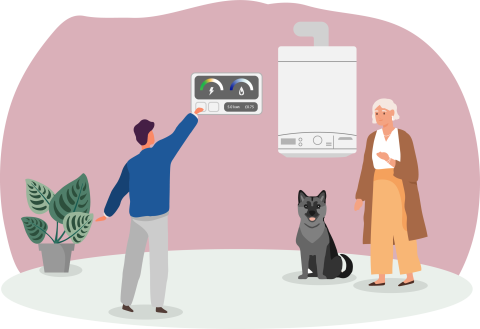
Choosing energy appliances for your home
When you are choosing new energy appliances for your home, for example a new kettle, you should consider the size of the appliance. Only buy the size you need for your family. Bigger appliances use more energy and therefore cost more money to run.
Once you have decided what size appliance you want, look for the energy efficiency label. This label tells you how much energy the appliance uses. You should look for the appliance that uses the least energy, as this will save you money on your energy bills and help the environment.
Energy efficiency ratings follow a scale of A to G, with A being the most efficient and G being the least. Some appliances use an older scale, from A+++ to G, with A+++ being the most efficient. Where possible, choose the appliance that's the right size for your home and has an A rated efficiency.
Which provide a useful guide on how to save money with energy efficient appliances.
What should I do with my old appliances?
You need to dispose of any electrical items correctly, as they contain hazardous substances.
Appliances with an image of a wheelie bin with a cross through it must not be thrown away in your regular rubbish bin. These appliances could include anything from a fridge to lightbulbs.
If you are buying a new appliance, the company may offer to take away your old one free of charge. You should ask if they offer free collection of your old appliance when you buy a new one.
Alternatively, you should take your unwanted appliances to your local recycling centre. You may also be able to arrange for your local council to collect the item. You should check your local council's website to find out whether this is a service that they offer.
You must not dispose of any appliances in an area that is not approved by your local council. This includes leaving your appliances in the street. Dumping rubbish in this way is known as fly-tipping and is illegal.
The punishment for fly-tipping includes imprisonment, unlimited fines and the loss of your right to drive any vehicle used to dump the rubbish.
Fly-tipping costs councils over £58 million per year. This is money which could otherwise be spent on other things in your community.

How do I use my appliance?
Knowing how to use your energy appliances correctly will save you money. You can find information on how to use your appliances on the manufacturer's website and in the manufacturer's user guides.
Some appliances which are often used incorrectly, leading to increased energy bills, are night-storage heaters and air-source heat pumps.
Night-storage heaters
The input control on your night-storage heater tells the heater how much heat to store up during the night. The output controls how much of this stored heat is released.
At night, you can turn up the input and turn off the output to store heat. During the day you should turn the input to the lowest setting.
You should adjust the input depending on how much heat you need. The higher the input setting, the more heat will be stored and the more electricity it will use. If you set it too high for the size of the room it has to heat, or for the time of year, you will be wasting money.
To make the stored heat last the day, put your output dial on the lowest setting when you go to bed and for most of the day. If you get colder in the evening, you can turn the dial up higher to release the stored heat - just remember to turn it back down when you go to bed.
Our solve an issue page has more information on using night-storage heaters.
Air-source heat pumps
Rather than turning your heat pump on and off like you might do with a traditional boiler, heat pumps are cheaper and warmer to leave turned on all day. If you have a heat pump and are finding your energy bills are higher than expected, this may be because you have been switching the heat pump off and on, costing you more money.
Our solve an issue page has more guidance on using heat pumps.
This article from CSE may also be useful..
Solving issues with energy appliances
If you are struggling with any appliances in your home that you bought, check the manufacturer's guide. Our solve an issue tool may also be useful. If the appliance is faulty, you should get in contact with the manufacturer.
If you are struggling with an appliance that we bought, use our solve an issue tool to see if there is anything that you can do to help. If your appliance is not working, you can contact us and our maintenance team will help you.
Try one of these pages to get started:
Solving issues with night storage heaters
Problems with your air or ground source heating
Repairing heating and hot water systems
Solving ongoing issues with your boiler
How much do my appliances cost?
Understanding how much our appliances cost to run can help us know where we can make savings.
NEA Action for Warm Homes have this useful leaflet on electricity consumption around the home.
Storage of heating oil
Storage of heating oil is your responsibility and we would advise you store this securely. Never store heating oil inside of your home. Instead, heating oil should be stored securely in a shed, garage, or in a secure outdoor space, away from direct heat or other sources of ignition that could cause the oil to catch fire.
Energy advice
For information and resources to help you manage your energy bills, visit our Energy Advice page.